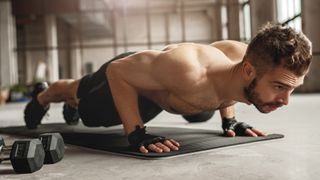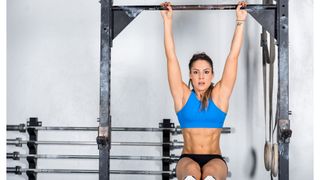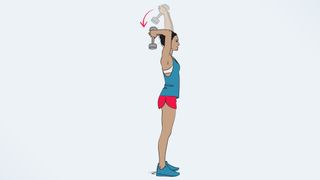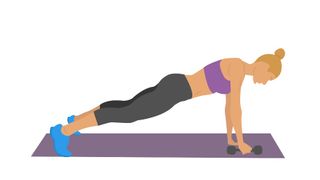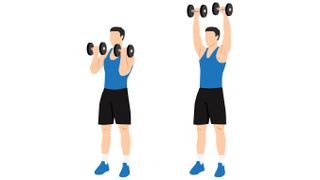A proper pectoral and triceps workout will hit the pectoral muscles, anterior deltoids (the front of the shoulders), triceps and core muscles hard.
This upper body workout uses five moves to burn these muscle groups and strengthen the upper body alongside your usual strength programs or classes. You can adjust it to a time limit that suits you, and most importantly, you can adjust it according to your personal experience level.
We love using barbells for upper body strength workouts, but to do that, you just need a pair of the best adjustable dumbbells. Bookmark this for later.
Before you begin, remember, building strength and developing muscle definition requires a consistent and balanced diet, ample protein intake, a regular and progressive exercise routine, and factors like sleep and stress management (you know, that’ thing” called recovery).
Additionally, much of the science tells us that NEAT — short for Exercise Thermogenesis — accounts for the heaviest portion of calories burned during the day. Basically, standing and walking more often could boost your metabolism and burn more calories cumulatively than, say, a HIIT workout or strength program.
But while one workout won’t destroy muscle or lead to immediate gains, consistently sticking to and advancing your programs might — learn more about progressive overload techniques here and why it’s important.
20 minute workout for pectorals and triceps in 5 movements
So, ditch the burpees and try these moves for your chest and tris instead.
1. Dead block
Dead freezes burning your core and arms, including forearms, biceps and triceps, shoulders and back muscles – latissimus dorsi (lats) and trapezius. The movement also develops shoulder and grip strength. You don’t need to flex or extend your muscles during dead hangs, so dead hangs use isometric contraction instead.
As:
- Stand under a pull-up bar and grip slightly wider than shoulder-width apart
- Wrap your thumbs around the bar and extend your arms
- Bend your pelvis towards your spine and tighten your stomach, shoulder, chest and back muscles
- Hang from the bar with straight legs. Keep your shoulders active and slightly pulled back.
2. Hollow grip chest press
The chest press builds strength and muscles in the pecs, anterior delts, triceps, and core muscles through the pushing motion. A hollow hold position requires full body contraction and builds stability and core strength. Learn how to do the hollow grip and bench press here.
As:
- Create a hollow grip shape by lifting your upper back and legs off the ground, tucking your pelvis slightly towards your spine and engaging your core
- Holding a dumbbell in each hand, extend your arms above your chest
- Bend your elbows and lower the dumbbells toward your chest, allowing your elbows to bend to the sides
- As you exhale, contract your chest and shoulders, push the dumbbells up and lock your arms overhead.
3. Dumbbell triceps extensions
Target and isolate your triceps muscles using triceps extensions, which build tone and definition in your arms and strengthen the muscles that support pushing movements like the chest press.
As:
- Stand with feet shoulder-width apart, one foot slightly ahead of the other for balance
- Engage your core and stand up through your spine
- Hold a dumbbell in both hands straight above your head. If you feel tension in your shoulders, lower your arms slightly
- Look straight ahead, exhale and bend your elbows to lower the dumbbell behind you
- When your elbows form a 90-degree angle, slowly raise your arms and return to the starting position.
4. Push-ups with dumbbell deficit
A deficit increases the range of motion at the bottom of the push-up. It’s a progression designed to build muscle and strength by increasing the time muscles remain under tension. The variation requires more strength and mobility, so approach with knees down until you can do one without knees.
Create a deficit by raising your hands using dumbbells.
As:
- Start in a push-up position with hands raised on two weights and shoulders stacked on the wrists
- Keep a straight line from head to toe
- Bend your elbows and do a push-up. Pause at the bottom
- Push back up to the starting position. Try to lower your chest as close to the ground as possible on each repetition.
5. Arnold press with dumbbells
The Arnold press stimulates all three heads of the shoulders: the anterior, lateral and posterior deltoids. It also works your chest and triceps, similar to the overhead press. Here’s how to do the Arnold press in more detail with a bass on why we love Arnie’s signature move.
As:
- Stand with feet shoulder-width apart, holding a dumbbell in each hand, with elbows bent and palms facing you
- Powerfully lift the dumbbells overhead as you rotate your palms away from your body
- Pause, then reverse the movement returning to the starting position
- Keep your core tight and spine high as you move, without arching your lower back.
Verdict
It’s all about pushing power with this five-move routine, but for a full upper-body workout, you’ll want to pair it with a 3-move workout for your back and biceps.
Complete upper body exercises like EMOM, every minute to the minute. Aim for 8-12 repetitions of an exercise, finishing with 10-15 seconds left before the next minute starts. Complete 4 rounds, for a total of 20 minutes of work, and adjust to a shorter or longer workout. Adjust the weights to your ability so that the last few reps are close to failure.
Triceps extensions work out the smaller muscles that support bigger lifts like push-ups and bench presses, so we often save them for the last section of a workout. During a 20-minute circuit like this, opt for lighter weights for isolation exercise and heavier weights for compound multimuscular moves: the chest press and the Arnold press.
It’s time to hit your chest and triceps all day with one big push.
More from Tom’s Guide
#Forget #burpees #5move #workout #builds #upper #body #minutes
Image Source : www.tomsguide.com
